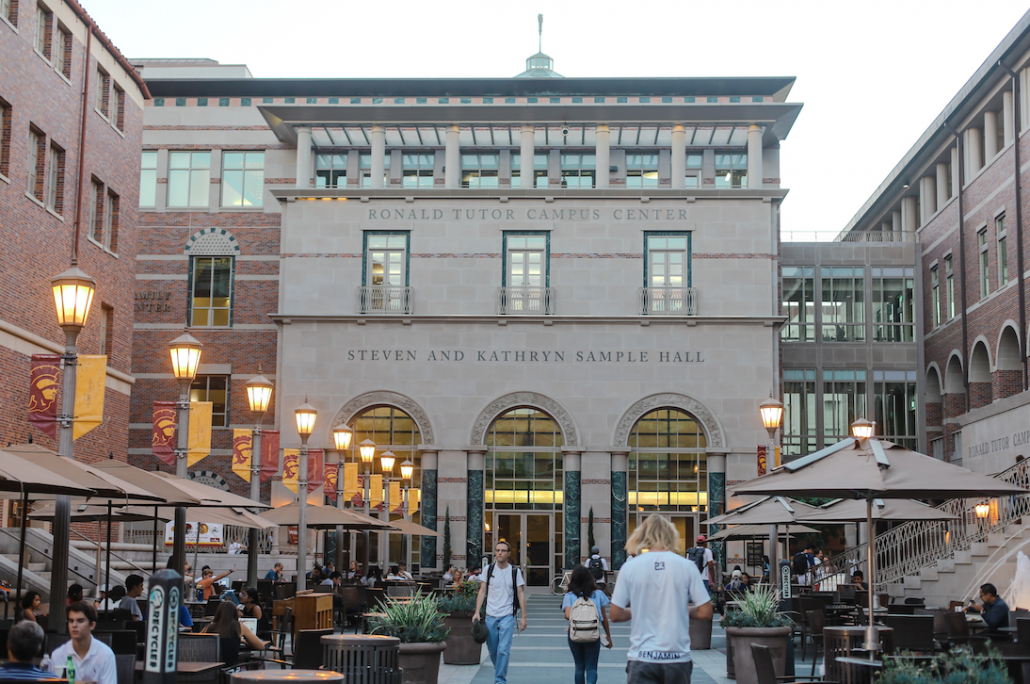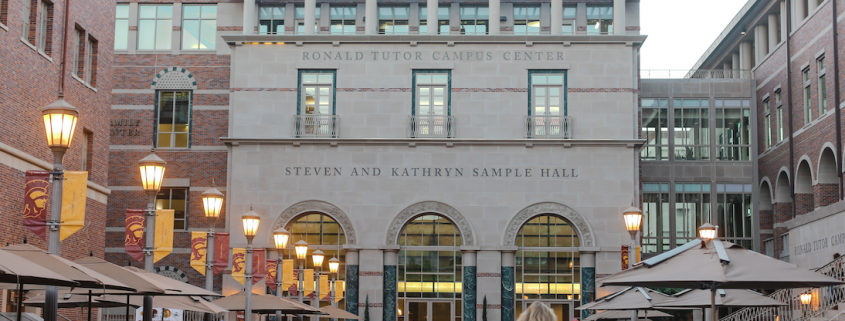Campus leaders hold open university forum

Graduate student Deborah McDonald was sleeping in the parking lot of a Vons supermarket in Inglewood before she came to USC to study social work. When she arrived, she sought help from the University, but she was met with little support.
“I told [an admissions counselor] what was going on with me. The first thing she told me was that USC could not help me with housing,” McDonald said to a room of around 250 students, faculty and staff at an open forum held Tuesday to address community concerns.
McDonald eventually learned about USC’s Homelessness Initiative, which includes access to a virtual food pantry and the USC Civic Engagement Housing Law Clinic, but she and other attendees at the forum said they are still not satisfied with the amount of resources available — or their level of accessibility.
“I hope that, after bringing this up, there’s more eyes and ears on the USC Housing Law Clinic,” said Jesse Ramirez, a graduate student in the Sol Price School of Public Policy. “Right now, if you go to the website and try to look them up, it’s as if they’re ghosts.”
Tuesday’s forum, which was organized by the Undergraduate and Graduate Student Governments, the Staff Assembly and the Academic Senate, was held at the Ronald Tutor Campus Center with a live video feed from the Health Sciences Campus. The forum, held a week after the FBI disclosed that USC is at the forefront of the largest college admissions scandal in U.S. history, served as an opportunity for members in the campus community to voice their concerns about the state of the University.
Plans for the forum were announced on March 6, weeks after six gay and bisexual former students filed a lawsuit against the University and former campus men’s sexual health doctor Dennis Kelly, whom they accused of sexual harassment and gender violence. The number of plaintiffs has now risen to 21, and the University has yet to release an official public statement on the lawsuit.
“The only way we can really care for our students here is to reinstate a sense of trust in our administration, and that really comes from a sense of accountability for things that have happened [like the Kelly allegations],” said Katie Thanos, a junior majoring in law, history and culture. “We feel like we’re being left in the dark, [and] we feel like our tuition dollars are being sent somewhere where they just kind of disappear … we don’t feel like we’re being listened to.”
Campus leaders such as USG president and vice president-elects Trenton Stone and Mahin Tahsin, Interim President Wanda Austin and Academic Senate President Yaniv Bar-Cohen were in attendance. Bar-Cohen stressed that Austin and other members of the administration were there to listen to the community’s conversation.
“I think this is a wonderful experiment, and I’m really glad to be in the room,” Austin said. “What’s most encouraging to me is the fact that we create these forums where we can have a diversity of opinion around difficult issues.”
The forum was held a week after the FBI disclosed in its investigation that USC is at the center of the largest college admissions bribery scheme in U.S. history, with the largest number of parents and University officials involved out of the eight colleges named.
The first of two conversational prompts at the forum asked how USC can balance tuition hikes with its goal of providing students with high-quality education.
Multiple people spoke about their personal experiences with financial insecurity on campus, from housing issues to the tuition hike that was announced Tuesday — raising next academic year’s tuition by 3.5 percent to $57,256.
Madeline McCue, a junior majoring in international relations and global health, said that amid rising costs, she believes USC should have a stake in its students’ success after they graduate.
“If the University is not adequately preparing you for a job that will get you that kind of income to pay back a student loan, it’s not worth it — quite literally,” McCue said.
Students and faculty from both campuses spoke about the issue of food insecurity.
“I really hate the fact that we call it food scarcity,” said Mark Malan, a member of the staff assembly and an accounting technician in the Provost’s office. “We have students that would be starving if it were not for the food bank. Putting fancy words on it doesn’t change the fact that these kids don’t have food.”
At the forum, Malan also spoke about rising costs of housing on and near the University Park Campus.
“[Developers] are going to charge $1,000 per bed … around USC,” Malan said. “And the reason they know they can charge that is because they know what USC Housing is charging for the dorm rooms. We, USC, drive this local housing market.”
Shany Ebadi, USG’s co-chief diversity officer, said she wished the administration offered immediate responses to people’s concerns. She also said she had hoped for a bigger turnout.
“I think the attendance could have been better,” Ebadi said. “If we are having these discussions there should be much more voices at the table, instead of the government representatives that are already doing this advocacy.”

